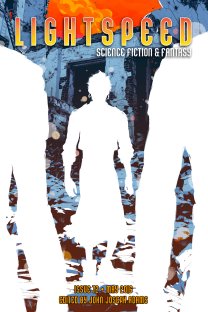“Three Points Masculine” by An Owomoyela
Reviewed by Nicky Magas
It’s a hell of a life serving in the City Guard, in “Three Points Masculine” by An Owomoyela, but what can a guy do when he tests three points too feminine to serve in the military? The revs blowing up half the damn city in their attempted government overthrow doesn’t make it any easier. Neither does having to struggle every day to reconcile your internal gender identity with whatever box the government decides to shove you in. None of it is fair, but a guy can’t change what he is, can he? No matter how hard he tries.
Owomoyela crafts a very believable Orwellian narrative in “Three Points Masculine” that is all the more powerful for putting the protagonist on the side of the government. The juxtaposition created by the protagonist and John both serving the City Guard while fighting private battles against the government’s oppressive policies creates a sparkling, vivid conflict that is internal, external and situational. The first person point of view is sharp and expressive, telling the reader as much about the world as the world itself. The plot unfolds naturally with neither too much nor too little exposition. Owomoyela knows exactly where se wants the reader to go and executes that plan with perfect precision.
In “The Jaws That Bite, the Claws That Catch” by Seanan McGuire, everyone is waiting for the Alice to return to Wonderland. Her life—or her death, depending how one looks at it—holds the key to ultimate dominion of the land. But waiting is difficult business for the impatient. And when the Queen of Hearts kidnaps a golden-haired child from the Tulgey Woods, it’s up to her sister to save her, by any means necessary.
Written in the shared universe of Lewis Carroll’s Alice in Wonderland, McGuire makes a protagonist out of a (supposed) antagonist and in doing so, shapes the world of Wonderland from a different perspective. The lore of the Alice and infighting between the card cities adds a great deal of depth to the original story, and to McGuire’s rendition of it. The writing itself is lovely and poetic, told through the first person point of view. The plot is unfortunately lukewarm beside the strength of the former two elements, but nonetheless “The Jaws That Bite, the Claws That Catch” is a good, darker examination of a classic children’s story.
In Mari Ness‘s “Deathlight,” Els and Dun have been marooned in space without fuel or hope of rescue. They’ve shut off all but the most essential life support functions—including the heat—in a last ditch effort to conserve what they have for the rescue they both know isn’t coming. A strange, tower-like craft way out in the shimmering deathlight of a nebula could be their salvation, however, if they’re willing to explore the heavy metal signals they pick up from inside it. The risk of the venture seems minimal compared to the rewards. But neither of them are prepared for what they will find within the craft. There’s a good chance that they’re not the only ones left abandoned in the middle of the vastness of space.
“Deathlight” is both hopeless and hopeful, alternating between the bitter cold of space and the brilliant colors of the alien craft to emphasize those feelings. The dialogue at times is a bit hard to follow. In keeping with the closeness of the two characters, they often speak to each other without finishing a complete thought, losing the reader from time to time in what is happening or who is speaking. The story itself is well crafted and does an excellent job of portraying the loneliness of being trapped in an inescapable situation, even with one whom you love.
Wednesday’s story begins with the tale of Solomon Grundy and quickly spirals out of control from there in Wole Talabi‘s “Wednesday’s Story.” Wednesday and her sibling days have sat for time immemorial, telling the stories of men and women who float through the timestream. Wednesday has heard and told enough tragic stories to know that Solomon Grundy’s isn’t going to end well, and when it comes around to her day to add to his sad story, she’s had enough. With the timestone she can change things, alter his story so that it doesn’t come to such a terrible end. Unfortunately, Wednesday is not just up against the forces of time, but against the very author itself.
“Wednesday’s Story” is incredibly clever, shot through with subtle allusions and fantastic cultural treasures of storytelling. Wednesday is a brilliant narrator, telling not only her own story, but the story of Solomon Grundy in fantastic detail, enriching what starts out as a children’s nursery rhyme and branches off into many other folklore tales to give the story a sense of depth and connection. “Wednesday’s Story” is a must read for anyone with a passion for the cultural value of the stories we nurture and pass down through the generations.
 Lightspeed #72, May 2016
Lightspeed #72, May 2016